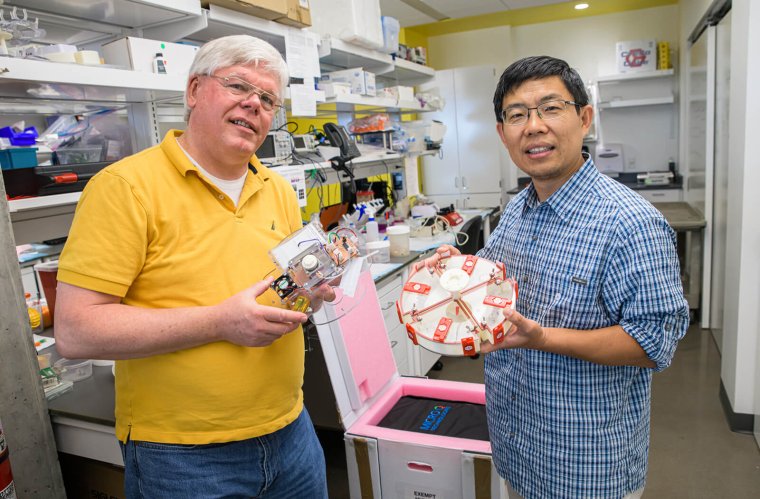
New technology from UArizona College of Medicine – Phoenix could expedite blood sample analysis
A new paper co-authored by the UArizona College of Medicine – Phoenix’s Dr. Frederic Zenhausern outlines a new technology that can expedite the analysis of human blood samples.
The paper, “Automatic reagent handling and assay processing of human biospecimens inside a transportation container for a medical disaster response against radiation” was also written by Adam Akkad, Brett Duane, Jian Gu, PhD, and Alan Norquist and was published in Plos One.
It outlines how the application of a micro-controlled centrifugal microfluidic system — lab-on-a-chip technology capable of analyses generally performed in laboratories — inside a shipping container can add reagent to an actively cultured human blood sample during transportation from a remote site of a radiological incident to a centralized laboratory. This would ensure a rapid biodosimetry of cytokinesis-block micronucleus (CBMN) assay.
Dr. Zenhausern, the director of ANBM and interim co-chair of the Department of Basic Medical Sciences, noted that the successful development of the technology could prove significant. “With the challenges in supply chain, as well as in the landscape of health care logistics related to decentralized care, global pandemics and vaccine delivery, alternative shipping technologies are highly desirable,” he said.
Dr. Gu, lead researcher at UArizona’s Center for Applied NanoBioscience and Medicine (ANBM) — and associate professor in the Department of Basic Medical Sciences, commented that “The U.S. government is also learning from the pandemic and understands the need to be prepared should a similar or more severe outbreak occur, such as accidental radiation exposure. Our technology is directly applicable to biodosimetry testing and fits the strategic medical countermeasures.”
To date, active reagent handling during transportation from a collection site to a laboratory or biorepository has not been achieved. And the inability to test samples while in transit can lead to costly delays or even inaccurate results.
Read more from the University of Arizona College of Medicine – Phoenix.
More news from the PBC
- XLR8 PBC Announces Inaugural Cohort
- College Hosts Inaugural Phoenix Neuroscience Community Data Blitz
- ASU’s School of Molecular Sciences and Creighton University launch 3+4 Doctor of Pharmacy (PharmD) Pathway
- Flinn Foundation’s BioCapital Conference Showcases Innovation, Investment, and Growth in Arizona’s Bioscience Sector
- ASU Unveils Groundbreaking Medical School at Phoenix Bioscience Core, Merging Medicine with Engineering and AI
- Two Arizona bio startups earn $100K through Flinn entrepreneurship program
- Mayo Clinic announces transformative $1.9B investment in Arizona
